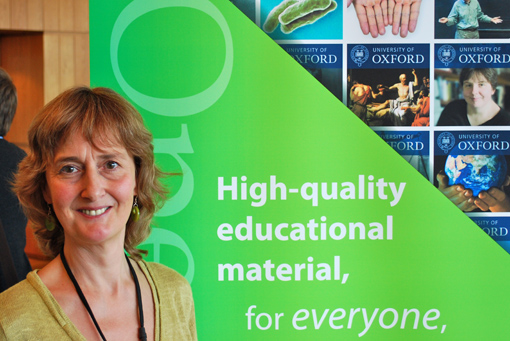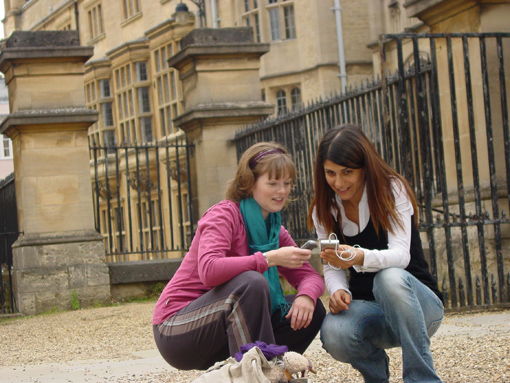Oxford Gets Wired
On 7 October 2008 the University of Oxford launched its podcast site on iTunes U. Four years and more than 4,000 audio and video podcasts later and Oxford’s iTunesU website has had more than 18 million downloads so far. Peter Robinson looks at its development in the light of its continuing expansion in the field.
 About the Author: Peter Robinson is of Manager of LTG Services (Learning Technologies Group),Oxford University Computing Services and is the leader of the Oxford on ItunesU and OpenSpires projects.
About the Author: Peter Robinson is of Manager of LTG Services (Learning Technologies Group),Oxford University Computing Services and is the leader of the Oxford on ItunesU and OpenSpires projects.
October 2012 marks the fourth anniversary of the launch of Oxford’s iTunesU site, featuring audio and video podcasts from across the University. It has been a great success – 18 million downloads so far, and currently we are reaching a worldwide audience of 185 countries. Oxford on iTunesU has grown from a very small corpus to more than 4,000 hours of material online – ranging from quantum states to welfare states, from Philosophy for Beginners to Quantum Mechanics. This free site has achieved the altruistic aim of bringing Oxford thinking to a broad global audience, whilst giving our current students and staff any-time access to a wider range of lectures than they might physically be able to attend. Among summer 2010’s most popular downloads were lectures entitled War and Finance, Probability Amplitudes and Quantum States and Building a Business: Entrepreneurship and the Ideal Business Plan.
In 2008, Oxford had the opportunity to be one of the first universities outside of the US to take part in iTunesU. This Apple educational service evolved from the original need at Duke University in the US to find a simple mechanism to push content onto their students’ iPods. Apple’s solution was to create an area within the iTunes directory for university content, both for the general public and for internal use. From these early beginnings in 2004 there are hundreds of educational establishments taking part now. The service has the advantage of building on student’s familiarity with the iTunes application.
The whole process has been dubbed ‘The University of iPod …
At Oxford it was quickly decided that this opportunity could encourage more colleagues to create audio and video material, as well as provide a one stop shop of material from across the University’s numerous departments and colleges. Leading a team behind the scenes at the University’s Computing Service we decided that we could create a workflow based on syndication through RSS that allowed new material from around the University to be surfaced from a central repository into both the iTunesU system and a parallel web video portal. We then worked with the legal services team to create an approval process. With these foundations in place the search for content began. The need for copyright clearance and the costs of digitisation meant that content in the early days tended to be from new events rather than archive footage. A regular training series was initiated to advise departments and evangelise about the ‘long tail’ benefits of publishing material for new global channels.
After launch the benefits became even clearer: much higher visibility of material with links back to the academics and departments involved. There are now more than 2,000 files freely available to the general public.
Interestingly a survey at the 2010 fresher’s fair showed that 60 per cent of those new to Oxford had already looked at the material before arriving.
The whole process has been dubbed ‘The University of iPod’ because of the simplicity involved in pulling educational content on to the portal media player. The user usually finds the subject material via a free text search across the whole iTunesU directory. From the results page they can select their preferred material and with one click subscribe to the whole series. The material can easily be synchronised across to the media player using the same system as used for downloading music. The subscription element – the ability to alert and notify the learner when more content is available – is the primary difference between the YouTube and iTunesU delivery models. This is key for building a relationship between the University and the user. There are currently 10 UK universities in the iTunesU directory and in YouTube Edu, the other major third-party educational media portal.
Marianne Talbot, an Oxford philosophy lecturer, is one of the early pioneers. After agreeing to record a series of introductory philosophy courses for the Department of Continuing Education she thought nothing more about it. Over time her material became more and more popular on the iTunesU system. When contacted by the technical team to say that she was currently the global number one, she started to reflect on what was happening, “I was tickled pink, I wondered what this meant? I started thinking: how many downloads is that? Presumably more than 20, but is it 100?” She was amazed to find she actually getting more than 5,000 downloads per week, already reaching more people than she will teach in a lifetime. Initial interest was success probably inspired by the engaging title ‘A Romp through the History of Philosophy’ but the feedback from her philosophy fans has been very positive, leading to Marianne recording more talks and seminars.
The business case for the service is based upon meeting various needs across the University: giving current students and staff access to colleagues’ work, while also reaching out to potential applicants and our global alumni audience. The Admissions Office at Oxford was the first to grasp the opportunity of podcasting, using this medium to give potential applicants an insight into life at Oxford. As one new student this year said, ‘I found the podcasts from the Admissions Office really helpful. As an international student they were a really good way for me to learn about the admissions procedure, as it’s not as easy for international students to come to the open days as it is for UK residents’.
After the first year of the iTunesU service, Oxford took the opportunity of widening the potential reuse of the material by looking further at the licences that the podcasts were released under – under an initiative called ‘OpenSpires’.
OpenSpires was funded under JISC and the Higher Educational Academy’s Open Educational Resources Pilot Programme: a funding initiative designed to support institutions, consortia and individuals in releasing open educational resources for use, reuse and repurposing worldwide. A key inspiration in this endeavour is the report written by Professor Sir Ron Cooke, chair of JISC, in 2008 entitled On-line Innovation in Higher Education. Commissioned by the UK government, the report provided expert advice and recommendations about how the country can become one of the leading centres of online higher education in the world. One of the findings of that report was that:
… the UK must have a core of open access learning resources organised in a coherent way to support on-line and blended learning by all higher education institutions and to make it more widely available in non- HE environments.
The OpenSpires project initially consulted a small group of academics interested in making their resources available to a wider audience, to understand what form of licence they would be happy to release their material under. The licence eventually chosen was one of the Creative Commons licences that specified that their material cannot be used commercially, that it can be adapted and translated, but that all versions of the work must also be open content when redistributed. The next stage was to make the necessary changes to the University’s release policy to allow this licence to be an option for future podcasters. The project used two main methods of acquiring content:
1. A fully supported model: resources from within the Podcasting Service were provided to support contributors in the production of podcasting materials (help with recording, editing etc.).
2. A devolved model of content production: by providing training to staff and some limited funding, podcasting activities could become part of the standard dissemination processes of the department. This meant that podcasts were submitted directly to the Podcasting Service with legal paperwork in place and relatively little work was required to release these via the web (see Figure 1 OpenSpires Content Workflow).
To date more than 150 academics have agreed to release their material for reuse in education. A wide range of subjects are covered, including politics, economics, globalisation, environmental change, business, research ethics, medicine, physics, English, philosophy, classics, and art history. There has been good feedback from learners downloading this material and this has encouraged academics to submit more material. At the time of writing, the OpenSpires site boasts more than 179 hours of audio and more than 72 hours of video, providing an impressive selection of open, educational, and reusable material. By summer 2012 over 2,000 podcasts are available from OpenSpires under Creative Commons licences and they can be found listed by series at http://podcasts.ox.ac.uk/open. The content is clearly labelled with the Creative Commons logo and is available for free on the open web and Oxford on iTunesU. A standard Google search for “subject area + creative commons Oxford” will find a huge set of teaching resources.
There are many reasons why academics have agreed to release their content for educational reuse but the most often stated reason is to support the next generation of students.. Peter McDonald, Fellow and Tutor in English,reflected on the benefits of open access,
In the late-19th century Oxford was one of the pioneers of the university extension movement, which enabled audiences around the UK to hear what some of its lecturers had to say on a wide range of topics. The OpenSpires project is the 21st-century equivalent though, with the benefit of the web, the audiences are now global and we hope even more diverse. It is a pleasure to contribute to this important venture, which is opening up Oxford like never before.
Summary
What lessons have we learnt in two years of podcasting? The key lessons are to work closely with the contributors in order to understand why they wish to engage with the public, and to recognise that launching a new institutional media service involves effective co-ordination across many different teams. As well as the core media service teams you need support from your computing service network team on the basic storage and infrastructure, you need to involve your communications team from day one to prioritise the key marketing messages and of course you need help from your legal services team to clarify the legal processes and to formalise a release form for contributors. A good project champion is also needed to explain the benefits to senior members of the University. We like to think of the secret weapon for sustainability at Oxford is training, to make sure we offer as much support for departmental staff as possible and to nurture a community of interested parties across the University.
Where might this all lead? If the first two years are opening up the virtual doors of the dreaming spires, then the next exciting stage is to see what other resources can be released through these popular social networks, connecting the best minds at Oxford.
Peter Robinson
Further links
Oxford on iTunesU – http://itunes.ox.ac.uk
Free Open Educational Resources at Oxford – http://openspires.oucs.ox.ac.uk
Toolkits for launching an institutional media service with advice from Oxford, Cambridge and the Open University and other pioneers – http://steeple.oucs.ox.ac.uk
 Learning on Screen
Learning on Screen



